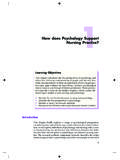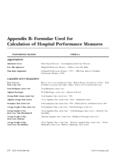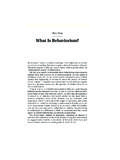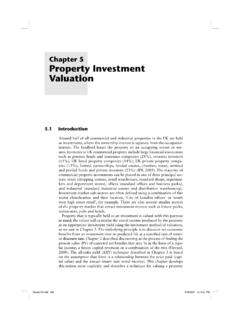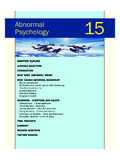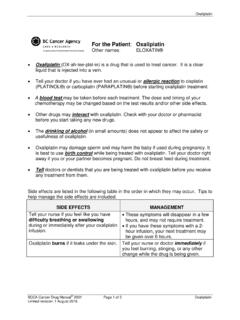Transcription of Health Psychology 19 - Blackwell Publishing
1 CHAPTER OUTLINELEARNING OBJECTIVESINTRODUCTIONHEALTH BELIEFS AND BEHAVIOURSB ehaviour and mortalityThe role of Health beliefsIntegrated modelsILLNESS BELIEFSThe dimensions of illness beliefsA model of illness behaviourHealth professionals beliefsTHE STRESS ILLNESS LINKS tress modelsDoes stress cause illness?CHRONIC ILLNESSP rofile of an illnessPsychology s roleFINAL THOUGHTSSUMMARYREVISION QUESTIONSFURTHER READINGH ealth 1/2/05 3:52 pm Page 408 Learning ObjectivesBy the end of this chapter you should appreciate that:nhealth psychologists study the role of Psychology in Health and wellbeing;nthey examine Health beliefs as possible predictors of Health -related behaviours;nhealth Psychology also examines beliefs about illness and how people conceptualize their illness;na Health professional s beliefs about the symptoms, the illness or the patient can have important implications.
2 Nstress is the product of the interaction between the person and their environment it can influence illness andthe stress illness link is influenced by coping and social support;nbeliefs and behaviours can influence whether a person becomes ill in the first place, whether they seek help andhow they adjust to their Psychology is a relatively recent yet fast-growing sub-discipline of Psychology . It is bestunderstood by answering the following questions:nWhat causes illness and who is responsiblefor it?nHow should illness be treated and who isresponsible for treatment?nWhat is the relationship between Health and illness, and between the mind and body?
3 NWhat is the role of Psychology in Health and illness?Human beings are complex systems and ill-ness can be caused by a multitude of factors, not just a single factor such as a virus or Psychology attempts to move away from a simple linear model of Health and looks at the combination of factors involved in illness biological ( a virus), psychological ( behavi-ours, beliefs) and social ( employment). Thisreflects the biopsychosocial model of Health andillness that was developed by Engel (1977,1980). Because, inthis model, illnessis regarded as theresult of a com-bination of factors,the individual is nolonger simply seen as a passive victim of someexternal force, such as a virus.
4 Acknowledging therole of behaviours such as smoking, diet andalcohol, for example, means that the individualmay be held responsible for their Health and to Health Psychology , the whole person should be treated, not just the physicalchanges that occur due to ill Health . This caninclude behaviour change, encouraging changesin beliefs and coping strategies, and compliancewith medical recommendations. Because thewhole person is treated, the patient becomesINTRODUCTION biopsychosocialthe type of inter-action between biological factors ( virus), psychological factors ( ) and social factors ( class) 1/2/05 3:52 pm Page 409410410 Health PsychologyMcKeown s emphasis on behaviour is supported by evidence ofthe relationship between behaviour and AND MORTALITYIt has been suggested that 50 per cent of mortality from the ten leading causes of death is due to behaviour.
5 If this is correct,then behaviour and lifestyle have a potentially major effect on longevity. For example, Doll and Peto (1981) estimated thattobacco consumption accounts for 30 per cent of all cancer deaths,alcohol 3 per cent, diet 35 per cent, and reproductive and sexualbehaviour 7 per cent. Approximately 75 per cent of all deaths due to cancer are related to behaviour. More specifically, lungcancer (the most common form) accounts for 36 per cent of allcancer deaths in men and 15 per cent in women in the UK. It hasbeen calculated that 90 per cent of all lung cancer mortality isattributable to cigarette smoking, which is also linked to other ill-nesses such as cancers of the bladder, pancreas, mouth, larynxand oesophagus, and to coronary heart disease.
6 And bowel can-cer, which accounts for 11 per cent of all cancer deaths in menand 14 per cent in women, appears to be linked to diets high intotal fat, high in meat and low in Health behaviours seem to be important in predicting mortality and longevity, Health psychologists have attempted toincrease our understanding of Health -related behaviours. In par-ticular, based on the premise that people behave in line with theOver the last century healthbehaviourshave played anincreasingly important rolein Health and illness. Thisrelationship has been highlighted by McKeown s book, The Roleof Medicine(1979), which discusses the decline of infectious dis-eases in the nineteenth century, which forms the focus for med-ical sociology.
7 It also highlights the increasing role of behaviourin illness in the twentieth century. The latter represents the focusfor Health Psychology . The commonly held view is that thedecline in illnesses such as TB, measles, smallpox and whoopingcough was related to the development of medical interventionssuch as chemotherapy and vaccinations. For example, antibioticsare seen as responsible for the decline in illnesses such as pneu-monia and TB. But McKeown showed that the decline in infec-tious diseases had already begun, before the development ofmedical interventions.
8 He claimed that, looking back over thepast three centuries, this decline is best understood in terms ofsocial and environmental also examined Health and illness throughout thetwentieth century. He argued that contemporary illness is causedby an individual s own behaviours, such as whether they smoke,what they eat and how much exercise they take, and he suggestedthat good Health was dependent on tackling these BELIEFS AND BEHAVIOURS partly responsible for their treatment. For example,she may have a responsibility to take medication,and to change beliefs and behaviour.
9 No longer isthe patient seen as a this perspective, Health and illness existon a continuum. Rather than being either healthyor ill, individuals progress along a continuum fromhealthiness to illness and back again. Health psy-chology also maintains that the mind and bodyinteract. It sees psychological factors as not onlypossible consequences of illness (after all, beingill can be depressing), but as contributing to all thestages of Health , from full healthiness to aims of Health Psychology can be dividedinto two main aspects:1. Understanding, explaining, developing andtesting theory (for example: what is the roleof behaviour in the etiology of illness?)
10 Canwe predict unhealthy behaviour by studyingbeliefs?).2. Putting theory into practice (for example: ifwe understand the role of behaviour in ill-ness, can unhealthy behaviours be targetedfor intervention? if we change beliefs andbehaviour, can we prevent illness onset?) Health psychologists study the role of psycho-logy in all areas of Health and illness, including:1. what people think about Health and illness;2. the role of beliefs and behaviours in becom-ing ill;3. the experience of being ill in terms of adap-tion to illness;4. contact with Health professionals;5. coping with illness;6.




